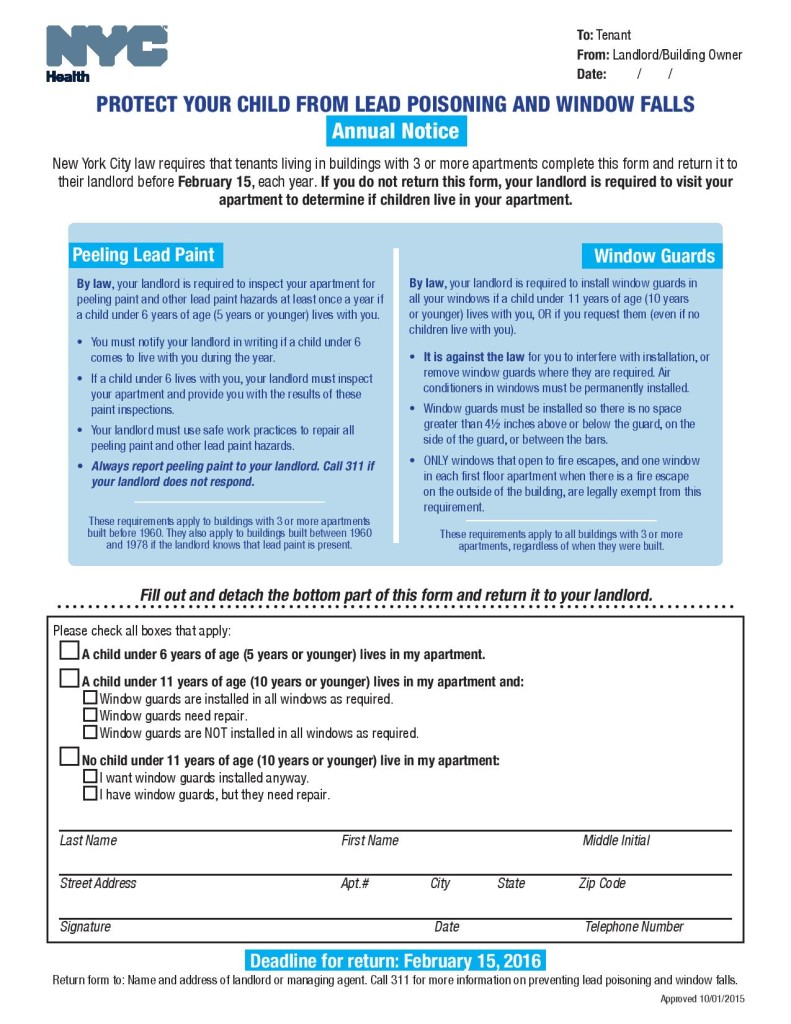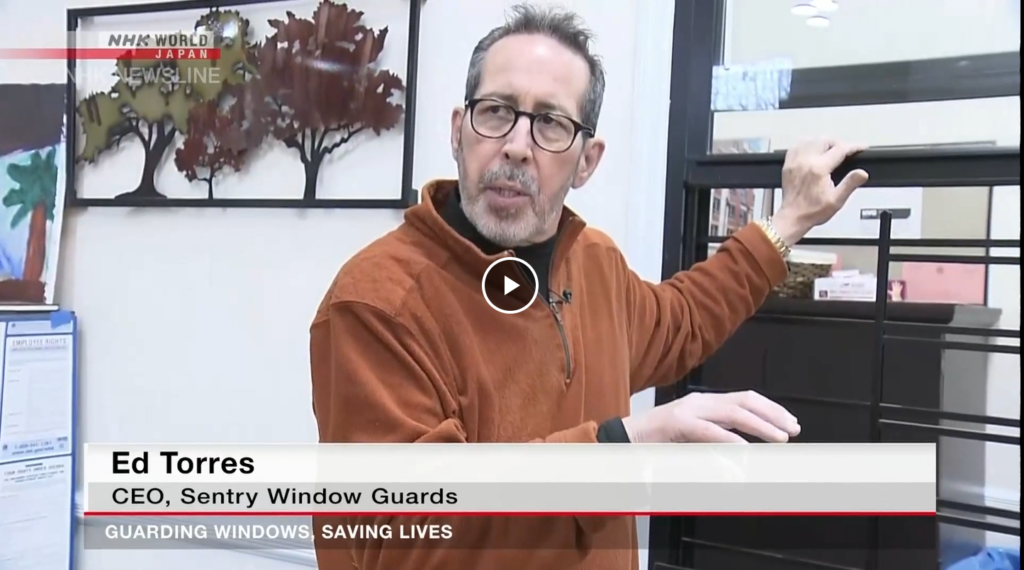Happy National Window Safety Week, April 3-9
National Window Safety Week is April 3-9, 2016 and Sentry Window Guards wants to remind everyone how important it is to have safe windows!
Why is Window Safety Week Important?
Window Safety Week happens at the start of each spring when folks are eager to open the windows in their homes to enjoy fresh air. The Window Safety Task Force states that its “goal is two-fold:
1. For families to understand the role of windows in escaping a fire or other emergency and
2. to learn to safeguard against accidental window falls.”
We hope that you will take 5 minutes to watch this video in an effort to prevent your child from falling out of a window.
Windows Can be a Lifeline in an Emergency Situation
Windows, as emergency escape routes, are the reason that many lives have been saved. How prepared is your family to to escape the potential of a fire emergency? There won’t be time to figure it all out when the disaster strikes. We hope that you will consider developing and testing an escape plan this week and practice it with your family at least twice a year.
The Window Safety Task Force suggests these items be a part of your emergency plan:
- Make sure windows are not nailed or painted shut
- Do not install air conditioners in windows that may be needed for escape
- Make sure at least one window in each bedroom meets escape and rescue requirements
- Window guards, security bars, grilles or grates render windows useless in an emergency unless they have a release mechanism; update them if necessary
- Develop an emergency escape plan and practice it during the day and at night
- Keep emergency escape ladders in second- or third-story bedrooms and teach everyone in the home how to use them
For more tips, visit the National Safety Council’s website and remember in New York, by law anyone with children 10 years or under must have window guards on their windows. Read more here or give us a call with any questions you may have.
Formed in 1997, the Window Safety Task Force works year-round in conjunction with NSC, the Consumer Product Safety Commission, Safe Kids Worldwide, the International Code Council and other safety advocates to promote window safety awareness.
Sentry Window Guards Sponsors Bronx Next Level Youth Basketball
We were proud to sponsor the Bronx Next Level Youth Basketball Camp!
Air Conditioners and Window Guards in New York: What you need to know!
You can feel it, the first hints of spring are coming to the Northeast and in no time at all it’ll be summer and hot! You have small children living in your house or apartment, love the safety of window guards but need to keep your residence cool through the blistering heat of a NYC summer. How can you have the best of both worlds? We’ll tell you!
You should always have at least two ways to exit your home or apartment in the event of a fire or an emergency, typically the front door being one exit and a window, balcony/terrace or fire escape as the second mode of egress. An air conditioning unit placed in a window not used as an emergency exit is perfect. If your window air conditioning unit is permanently installed there should be no risk of a child or adult falling from the window.
Stringent rules for NYCHA residents
NYCHA currently installs window guards in all windows, including those leading to a balcony or terrace at no cost to the resident. Only windows that provide access to fire escapes and windows that serve as a secondary exit in a first-floor apartment are the exceptions to this rule.
If a full set of windows guards aren’t installed in your apartment, please contact the Customer Contact Center at (718) 707-7771 immediately. Upon receipt of your call, we will install window guards in any windows that do not have them.
According to all NYCHA Lease Agreement’s, residents must cooperate and assist the NYCHA to comply with New York City window guard laws concerning their installation and maintenance. In addition, the Annual Window Guard Survey must be completed by all residents and occupants. If according to the completed survey children 10 years old or younger occupy, reside or frequent the residence, window guards must be installed by law and you cannot refuse them.
Residents and occupants who fail to comply may be subject to penalties and/or termination or tenancy.
NYCHA residents using air conditioners in place of window guards
Air conditioners can be an acceptable alternative to window guards if they are properly and permanently installed and cannot be removed seasonally. You must complete a form, have it executed by the Housing Manager or their designee, and notify NYCHA within three days after installation. All air conditioners are to be installed at the tenant’s expense. There are further stipulations as to the exact method of installation, they can be found here:
http://www.nyc.gov/html/nycha/html/residents/air-conditioners-window-guards-notice.shtml
If at any time during an inspection it is deemed that your air conditioning unit is unsafe and presents a danger to others for any reason, it will be removed immediately and a window guard installed in its place.
Additionally, if you should remove any air conditioner a maintenance worker must be present and scheduled during normal business hours so that they may install window guards immediately after the units removal.
For more information, please follow this link- http://www.nyc.gov
Using Space Heaters to Heat your Home
The holidays are over and suddenly it feels like winter! Many New York City residents live in older apartment buildings and homes. In fact, some of the oldest homes in the nation can be found in our great state which boasts a median age of 57 years. While older homes have weathered the test of time, they sometimes lack many attributes that newer homes contain like insulation, energy efficient windows, and newer forms of heating. In other words, older homes can be a bit drafty and cold during the winter.
Safe Options
In a perfect world, nobody would have to use a space heater to supplement their home or office heating, but we’re all individuals and some of us like things warmer or cooler than others so they’ve become a necessity at times.
Use these tips from NYC.gov to supplement your heat while keeping your family safe.
- Space heaters should be treated as temporary heating devices and used sparingly
- Keep your space heater away from anything that could catch fire, such as furniture, drapes, and carpeting. Keep all combustible materials, at least. three feet away from your heat source. Never use your space heater to dry your clothing.
- Never leave a space heater running unattended, especially where children are present. Always keep an eye on your equipment for any safety-related changes. Make sure you turn it off when you are unable to monitor it or when leaving.
- Plug space heaters directly into a wall outlet. Never use an extension cord or power strip. Do not use space heaters with frayed or damaged cords
- Make sure you have a working smoke alarm in every room. Test them at least once a month and change the batteries twice a year. Make sure your smoke alarms have a carbon monoxide detector.
Un-Safe Options
Never use a Kerosene or propane heater indoors. If not ventilated properly, carbon monoxide can build up. Only use portable heating equipment that is approved for indoor use. Signs of carbon monoxide poisoning include headache, nausea, vomiting, dizziness, sleepiness, trouble breathing, and loss of consciousness. Severe poisoning may result in permanent injury or death.
If you are having trouble paying your heating bill, there is help out there for you, call 311 for more information.
For questions or to report exposure to carbon monoxide, call the NYC Poison Control Center at 1-800-222-1222. Poison specialists are available 24 hours/seven days a week.
To report heating breakdowns, gas leaks or housing maintenance problems in rental housing, call 311.
For more information about the NYC carbon monoxide detector law and the sources of carbon monoxide call 311.
______________________________
Sources:
http://eyeonhousing.org/2014/02/the-age-of-the-housing-stock-by-state/
http://www.nyc.gov/
Stay Warm This Winter With These 6 Tips
Winter is officially here with temps in the 20’s and 30’s and snow in the forecast. Keep your home warm by setting your thermostat properly, reversing ceiling fans, and considering energy efficient windows. But what about “winterizing” you and your family? As we experience colder temperatures this winter, winterize yourself with these 6 tips:
- DRESS IN LAYERS: You can always remove a layer when you are hot. Thanks to polypropylene and silk, long underwear provides additional heat without the bulky versions of the past. Wear warm socks or slippers to keep your feet warm.
- MOVE YOUR BODY: Nothing warms the body up quicker than to get it moving. Run up and down the stairs a few times or grab your family and have a dance party in your living room. You’ll be shedding some of those layers quickly while having fun and doing your body good!
- HOT DRINKS AND FOOD: Feel your body instantly warm up by sipping on a warm cup of coffee or hot chocolate. Add a bowl of hearty beef stew and a slice of warm bread to warm your insides and satisfy your palate!
- KITCHEN HEAT: Get cooking and baking in your kitchen and you’ll be surprised how quickly it can help warm your home. Run your dishwasher during the day and open it up after the cycle to allow some of the warm steam to seep into your kitchen.
- WARM SLUMBER: Dress warmly and have warm bedding. Flannel or jersey sheets are much more cozier than chilly percale sheets. Warm bodies rest better than shivering ones!
- SNUGGLE: Nothing is better than snuggling! Body warmth is almost as good as a heating blanket. Got no body or pet to snuggle with? Make a minimal investment in a body pillow or pull out that huge stuffed animal you won at the carnival in high school!
At Sentry Window Guards we make it our mission to help keep families safe. While our business is to help prevent falls from windows, we also recognize the importance of staying warm and safe this winter. For more information regarding our window guard products and our experience and leadership in understanding NYC safety requirements, contact us today!
Know the Dangers of Lead Paint on Window Sills in New York
According to the U.S. Department of Health and Human Services, lead poisoning is “the number one environmental threat to the health of children in the United States.” In their most recent survey, approximately 4.4% of all children aged 1-5 have levels of lead in their blood that equal or exceed the threshold level of concern established by the Centers for Disease Control (CDC). And while these numbers are down from just a few years ago, lead exposure is a great concern.
Most lead-poisoned children have been exposed in their own homes. If you rent your apartment or home, controlling your family’s exposure to lead is more difficult to control. Many New York City apartments are older dwellings and even though lead-based paint has been banned for residential use since 1960 older buildings contain old layers of lead paint. Lead paint was typically used on kitchen and bathroom walls and throughout homes on doors, windows, and wooden trim. Unless tested you can’t be sure if it was used in your home or apartment. Before you move in, ask the landlord if the paint has ever been tested for lead. If it has, ask to see the results. However, landlords in New York State are not required to test paint for lead, nor are they required to allow a prospective tenant to test paint for lead before renting.
Symptoms of Lead Poisoning
The most common way children get exposed to lead is by mouth. They may chew on a window sill or other area that contains lead. Symptoms of lead poisoning vary. They may affect one area or many parts of the body. Typically, lead poisoning builds up slowly after many small exposures to lead.
Lead toxicity is rare after a single exposure or ingestion of lead.
Signs of repeated lead exposure include:
- Abdominal pain, cramps
- Aggressive behavior, irritability, fatigue
- Constipation
- Headaches
- Loss of developmental skills
- Loss of appetite
- High blood pressure, anemia. Kidney problems
- Numbness or tingling in the extremities
- Memory loss
NYC Lead Paint Notice
New York City law requires that tenants living in buildings with 3 or more apartments complete the attached form and return it to their landlord before February 15, each year. If you do not return this form, your landlord is required to visit your apartment to determine if children live in your apartment. This form also applies to dwellings built from 1960 – 1978 if the landlord knows lead paint was used.
Please see below for the form or click on the link below-
http://www.nyc.gov/html/doh/downloads/pdf/lead/lead-annual-notice.pdf
Sentry Window Guards is the leader in home and business safety. Contact us today to learn more about our window guard products, our experience and leadership in understanding NYC requirements and how we can assist you.
Sources
http://www.ag.ny.gov/environmental/lead/lead-paint-hazards
http://www.healthline.com/health/lead-poisoning#Symptoms4
Get Your Auto Ready for Winter
While protecting your home is a priority for New Yorkers, some still need an automobile to get around the city that never sleeps and others own one for weekend adventures. It’s important to prepare your auto for the harsh conditions it may face when winter arrives. Sentry Window Guards hopes that you’ll consider these tips when driving this winter either at home or on a winter vacation!
Get Your Car Serviced
The quickest way to ruin a trip out to the burbs is to break down when it’s cold and snowy. Try to avoid a potential breakdown by taking your vehicle to the mechanic and have any routine maintenance or tune-ups performed. While there, ask the mechanic to look for the following potential problems:
- Worn hoses, parts, leaks or anything that looks like it needs to be replaced.
- Have your battery checked to verify that it still has sufficient voltage and test the tightness of the cable connections. It takes more power for your battery to work efficiently in the winter. For hybrid and electric vehicles, your driving range is reduced in winter but work more efficiently once warmed up.
- Ask your mechanic to look over your cooling system.
What You Can Do
- To support the gasoline system in an electric vehicle, always keep it filled with fresh gas.
- Fill your windshield washer reservoir with a “no-freeze” fluid.
- Check your windshield wiper blades for wear and tear, replace them if necessary.
- Check your cars heating system and defrosting system.
- Take a good look at your tires, check them for wear. Tires should have at least 1/16 of an inch of tread on them. Also, check their inflation, when the temperature drops the air pressure in your tires drops. Put snow tires on your vehicle prior to the first storm if you plan to use them
- Practice winter weather driving off of a main road. It’s common to forget how to drive in ice and snow between seasons.
Be Prepared
While you can’t think of every possible scenario, follow these guidelines and keep your car stocked in the event you get stranded.
- Carry a small snow shovel, ice scraper, and whisk broom.
- Sand or kitty litter in case you get stuck in the snow.
- Flashlight, flares, jumper cables.
- Spare blankets, hats, and gloves
- Food and water if you’re going on a longer trip.
- Fluorescent tape
If You Become Stranded
- Don’t panic.
- Stay with your car, keeping your seatbelt and dome light on.
- Place strips of your fluorescent tape on your outside antenna.
- Don’t keep your car running, you risk asphyxia or carbon monoxide poisoning.
- Periodically, remove the snow from your tailpipe and only run the car sparingly.
These tips should help keep your automobile in top shape and you safe this winter, and when you need to think about safety for your New York home, consider Sentry Window Guards to keep your family safe and secure.
Sources
Creating Your Fire Safety Plan in New York
Creating a Fire Safety Plan in New York
As summer winds down and cooler temperatures begin arriving we’ll all begin spending more time indoors, as a result, most home fires occur between the months of November through March. Now is the time to make a fire plan or review your existing one. Fire’s don’t just happen to careless people, anyone could be at risk.
Here are some recent statistics:
- In 2014 public fire departments in the United States responded to 1,298,000 fires.
- In 2014, 494,000 fires occurred inside of a structure.
- An alarming 74% or 367,500 fires occurred inside of homes.
- Every 86 seconds a U.S. fire department responded to a home fire in 2014.
- Cooking equipment is the leading cause of reported and unreported home fires and injuries.
- Children under five years old are almost 1-1/2 times more likely to die in a home fire as the average person.
- Most home fires that cause child deaths occur during the months of December – February.
- In 2014, there were 26,531 structural fires in the five boroughs of New York City with an FDNY average response time of 4 minutes and 9 seconds.
What to Do
Leaving you as little as one or two minutes to escape once your smoke alarm sounds, fire can spread rapidly through your home. This is a great opportunity to get the entire family involved in creating an escape plan. You should try to create two means of escape from each room, utilizing windows and doors. Sometimes a drawn floor plan with escape routes and smoke alarms noted is easier for children to understand.
NAFTA provides a very child-friendly, interactive grid which gets children involved in a safe, fun way.
http://www.nfpa.org/safety-information/for-consumers/escape-planning/basic-fire-escape-planning
NAFTA recommends that smoke alarms be installed in every room where anyone sleeps, outside each sleeping area and on every level of the home.
It is imperative that every person in the household understands the escape plan. During your fire drill, make sure the escape routes are clear and doors and windows can be opened easily.
Fire safety in a high rise or apartment building has its own challenges because of many differences such as time/distance to get out of the building, smoke movement, and fire department access.
Best practices for planning an escape from an apartment building can be found here: http://www.nyc.gov/html/fdny/pdf/safety/fire_safety_education/2010_02/07_residential_apartment_fire_safety_english.pdf
- Choose an outside meeting place (neighbor’s house, a light post, mailbox, or stop sign) a safe distance from your home or apartment building where everyone can meet after they’ve escaped. Make sure to indicate your meeting place on your family’s escape plan.
- Make sure your street number is clearly visible from the road so that responding emergency personnel can find your home.
- Make sure everyone is familiar with contacting 9-11 or the Fire Department directly.
- If there are infants, older adults, or family members with mobility limitations, make sure that someone is assigned to assist them in the fire drill and in the event of an emergency. You’ll need a backup person in case the person assigned to assist isn’t home during the emergency.
- If windows or doors in your home have security bars, make sure that the bars have an emergency release so that they can be opened immediately if necessary.
- You should consider telling guests or visitors to your home about your family’s fire escape plan. When staying overnight at other people’s homes, ask about their escape plan. This is especially important if your child attends a sleepover.
- If your smoke alarm sounds, be fully prepared to get out.
- Once you’ve escaped the fire, stay out! Do not go back into a burning building. Let the fire department know if someone is missing.
Testing your Plan
- You should have a home fire drill at least twice per year. Once children have mastered your escape plan, consider having one at night when they are sleeping. You don’t want to frighten them, so tell them before they go to bed that you’re having a fire drill. Having a fire drill at night will also let you know if anyone in the house sleeps through the smoke alarm, if so, assign them a buddy who will wake them up.
- If your home has two floors, make sure everyone can get out of a window easily from the second floor.
- Teach your family to stay low to the ground to avoid any toxic smoke.
- Close doors as you escape, which slows the spread of the fire and may give you more time to escape safely.
- Teach family members, especially children what to do in the event that they cannot escape. Show them how to stuff towels or clothes under doors to prevent smoke from entering the room they are in.
- Don’t forget to teach everyone about testing the door for heat before you open it.
- Make sure everyone understands “stop, drop and roll”.
Fire Prevention Week
NFPA has been the official sponsor of Fire Prevention Week since 1922. According to the National Archives, Fire Prevention Week is the longest running public health and safety observance on record. This year’s fire prevention week will be October 4 – 10th and the theme is “Hear the Beep Where You Sleep.” For more information on Fire Prevention Week click here: http://www.nfpa.org/safety-information/fire-prevention-week
The FDNY has a very interactive fire prevention department, for more information click on the link: http://www.nyc.gov/html/fdny/html/safety/index.shtml
At Sentry Window Guards, your family’s safety is very important to us! If you have questions about fire safety and your current window guards, give us a call!
________
Sources
http://www.usfa.fema.gov/data/statistics/
A Day of Remembrance: 14th Anniversary of the 9/11 Attacks
The September 11th National Day of Service and Remembrance came about in 2002 through the combined efforts of several nonprofit organizations, citizens and from national service organizations. This group effort of “giving back” to honor those who lost their lives and the survivors of the 2001 terrorist attacks became a nationwide inspiration.
Congress designated September 11th as a National Day of Service and Remembrance as Federal Law in 2009. The Corporation for National and Community Service along with My Good Deed and several other organizations have created one of the largest days of charitable service in U.S. History.
Each year Americans will come together in service on September 11th to unite in the same incredible way that so many did after the attacks.
It is expected that there will be opportunities to give back to your respective communities in all 50 states painting benches, cleaning up neighborhoods, helping the elderly, veterans, and more.
To find what is happening in your community, click here: https://911day.org/volunteer/
There are number of opportunities within all five boroughs of New York City; making cards for Senior Citizens, making sandwiches, commemorative cards, beautifying a local park and much more.
To organize a service project in your area, go here: http://www.serve.gov/?q=site-page/toolkits
However you spend this 14th anniversary of the 9/11 attacks, take a few moments and remember those that lost their lives that day.
God Bless America!9/11911
Sources
http://www.serve.gov/
http://www.nationalservice.gov/tags-tags/mygooddeed










